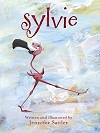|
Sylvie

Last updated Wednesday, March 29, 2017
Author: Jennifer Sattler
Date of Publication: 2009
ISBN: 0375857087
Grade Level: Kindergarten (GLCs: Click here for grade level guidelines.)
Date(s) Used: Apr. 2017
Synopsis:
"Mama, why are we pink?" asks an ever-curious young flamingo named Sylvie. Sylvie comes to learn that being yourself is the best thing to be. When she learns that it’s due to the little pink brine shrimp they eat, Sylvie takes the maxim "You are what you eat!" to a whole new level. Her new diet leads to some very interesting new looks - from scarlet to stripey to positively purple!
| Discussion topics for before reading: |
| • |
What type of bird is Sylvie?
Vocabulary
|
| • |
brine shrimp - Brine shrimps are found in inland and coastal saline and hypersaline waters throughout the world, with the exception of Antarctica.
|
| • |
bouquet - an attractively arranged bunch of flowers, especially one presented as a gift or carried at a ceremony.
|
| • |
paisley - A piece of paisley fabric. adjective. The definition of paisley refers to a pattern of colorful curved comma-shaped designs that is based on a design from India. Fabric that has a colorful swirly pattern that is used to make curtains or a skirt is an example of paisley.
|
| Discussion topics for during/after reading: |
| • |
Why are Sylvie and her family pink?
|
| • |
What types & colors of food did Sylvie try eating?
|
| • |
What is your favorite food Sylvie ate?
|
| • |
What is your favorite color?
|
| • |
What color is your favorite type of food?
|
| • |
Why did Sylvie go back to eating little pink shrimp, like her family ate?
|
*Note: These craft ideas are just suggestions.
You can use them, but you don't have to use them.
You can expand upon them, or add your own twist.
Remember, though, that the focus of your time should
not be on the development and execution of a craft;
the focus should be on the read-aloud and the
enjoyment of the book!
|
